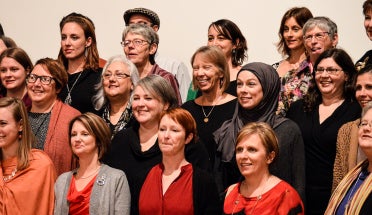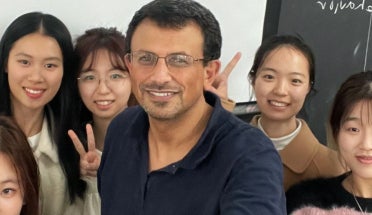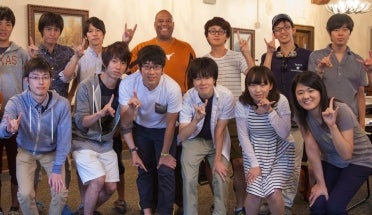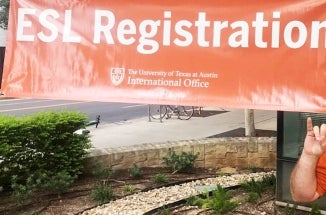
Language, Learning and Legacy: English Language Center Director Michael Smith
- Jun 12, 2025
- English Language Center
- by Ellen Stader
When visiting students first arrive in Austin to attend courses at the English Language Center (ELC) on the campus of The University of Texas, ELC Director Dr. Michael T. Smith just might be the first Longhorn to greet them.
“I love to pick up students from the airport and be the first person they meet when they arrive,” said Smith. “To be there, to see them so excited about getting here, it’s one of my favorite things to do.”
Smith deliberately drives the long way back to campus so his passengers can glimpse an elevated view of the entire city, revealing the Texas Capitol and the UT Tower.
“They've all done their research; they've seen that tower already,” Smith said, grinning. “They point and take pictures and bring them in on their first day [of class]. I just love it.”
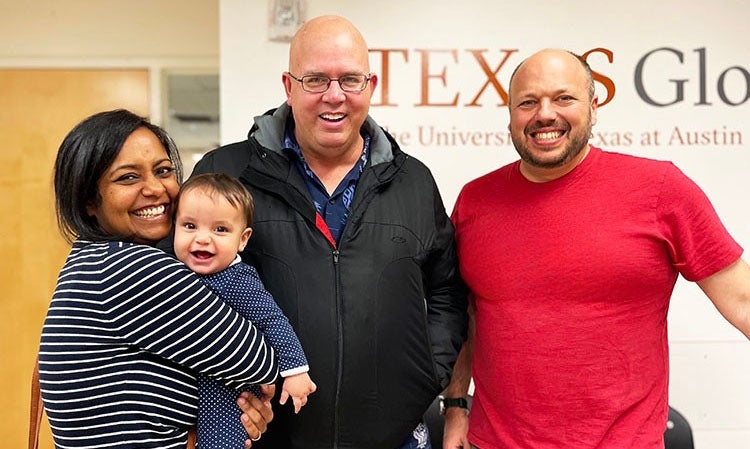
The pleasure Smith finds in working directly with English learners is mirrored by his dedication to facilitating the work of their teachers. Since 2002, he’s hired, trained and supported more than 120 English as a Second Language teachers, and the ELC has enrolled more than 10,400 students from 87 different countries around the world.
All Signs Point to Language
Smith may have been destined to work with languages. He speaks five: English and Spanish fluently, Portuguese with intermediate proficiency, and beginner Mandarin Chinese and Yucatec Mayan. Not surprisingly, his early experiences combined to make international language learning seem like a natural career choice.
These began before his birth, in fact. Smith’s father lived in Brazil from 1960 through 1963. While there, he immersed himself in the culture, learning to speak fluent Portuguese and play Brazilian guitar.
“I always loved when he would bump into somebody from Brazil or Portugal and speak Portuguese,” said Smith. “I thought it was amazing that he could flip into another language and just talk to them.”
At age 6, Smith moved with his family to Hawaii, a melting pot that gathered people from the global East and Pacific Rim. Growing up where white people are a minority deeply influenced his outlook. His friends spoke Samoan, Tongan, Tahitian, Japanese, Korean and several dialects from the Philippines, among other languages.
“All of that was very natural to me growing up,” said Smith. “I assumed everybody was having those same kinds of experiences in their growing-up years.”
Learning to Teach, Teaching to Learn
After his first year of college, Smith made a missionary trip to the Yucatan Peninsula in Mexico. He dedicated the first six months of his two-year stint to learning Spanish, also picking up a little Yucatec Mayan by speaking with local Indigenous people.
The mission experience transformed Smith’s outlook, pushing aside his earlier vague notions of law school.
“After two years of living in the Yucatan Peninsula, I came home thinking, ‘I want to do something with languages or anthropology.’ It completely changed my academic trajectory,” said Smith.
A Spanish professor counseled him to look into teaching English as a Second Language (ESL).
“I took courses in linguistics and ESL methods and found out, ‘Oh, yes, this is what I like to do!’ ” said Smith. “That really ... focused my trajectory toward studying languages and cultures and the relationships that form from them.”
Another professor advised Smith to take computer classes and learn a non-romance language. Smith followed his advice on both counts, choosing Mandarin Chinese for the latter. Learning Mandarin — so unfamiliar to him in its intonation, structure, and other aspects — expanded his linguistic capacity and, later, his empathy for language learners.
During undergrad, Smith taught Spanish at an elementary school in Oahu. After graduating in 1993, he enrolled at Brigham Young University to pursue a master’s degree in linguistics and ESL, also teaching at BYU’s Intensive English program and a local senior center.
“There were a bunch of nice Spanish-speaking senior citizens whose one goal was to learn enough English so they could talk to their grandchildren, who didn't speak Spanish,” Smith recalled, adding that both teaching jobs played a major role in shaping his early career.
A Forever Home in Texas
After obtaining his master’s, Smith moved to Austin in 1995 to start Ph.D. work. There he was hired to teach at UT's on-campus ESL Services, at the time housed within the University’s International Office (now called Texas Global).
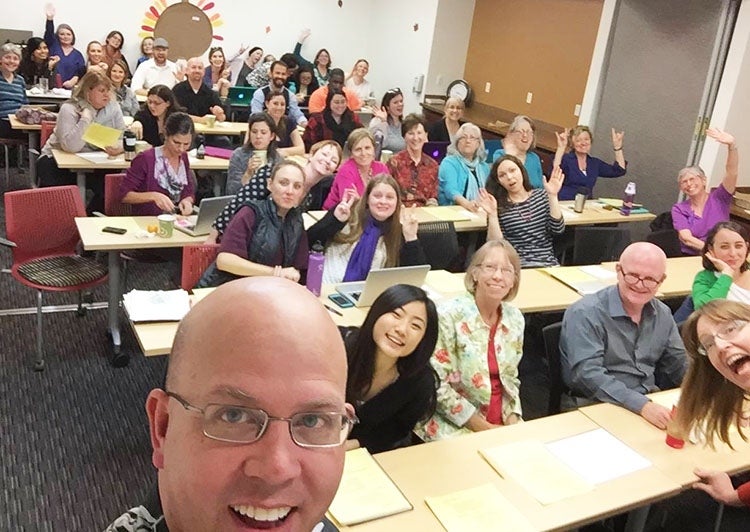
By 1998, the fast-growing office was preparing to move into a larger campus space, with plans to establish a new computer-assisted language-learning lab in the process. Given his training, Smith was the natural choice to oversee it.
“I got to research and buy computers and software, then set them up in our first language lab,” said Smith. “I became a member of the administrative team for ESL Services at that time, and I found that I really enjoyed the administrative side of things.”
While managing the lab, Smith met Teresa Baker, an experienced instructor who was hired in 1999 as the ELC’s assistant director.
When the ELC director returned to teaching full-time in 2000, Jerry Wilcox, then director of the International Office, invited Smith to step into the role of interim director. Smith said he would take the position with a single stipulation:
“I agreed to take the job on the condition that Teresa Baker be allowed to continue in her role as assistant director,” recalled Smith. “If she was leaving, I said, I didn't want to have anything to do with that.”
Collaboration for Success
Fortunately, his terms were accepted, and Smith has now held the position of ELC director for 25 years. During that time, he and Baker have proven an unstoppable team.
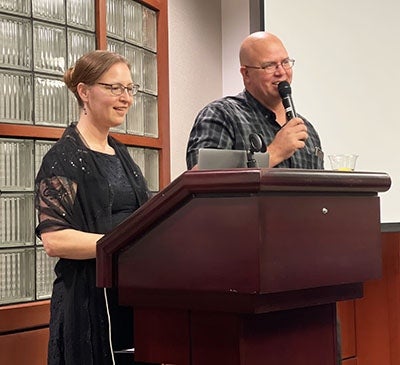
“Key to our success is Teresa Baker,” said Smith. “She's an amazing individual, a smart, proactive, get-it-done person. Any initiatives or programs that have happened ... she's really been a major contributor.”
Baker’s mutual esteem for Smith was apparent as she spelled out the director’s gifts and effects that resonate from his work.
“What strikes you immediately about Mike is his ability to put people at ease and to make them feel heard and understood,” said Baker. “That’s led to an incredible legacy of relationship building — teachers who spend their whole careers with us, partners who work with us year after year, and students who had such fond memories of their studies that they’re now sending their children to us. It’s a remarkable gift.”
To build this legacy, Smith leaned into his enjoyment of recruiting students, crunching numbers and facilitating teachers’ needs. His and Baker’s initial goals were to “get a handle on the budget” of the self-funded unit, then to assess and organize the center’s services.
To make sure they correctly represented the perspectives of employees (many of whom were far senior to themselves), Smith and Baker assembled a steering committee, affording ELC faculty members a voice in shaping the organization’s policies. The experiment worked so beautifully that the group wrote a proposal and was invited to present at that year’s TESOL International Convention on the topic, “Steering a Program by Committee.”
Meeting the Needs of Learners
Smith recalled several initiatives that inspire his pride, among them the customized programs devised to expand the center’s offerings to groups with specific language needs from across the world.
The global economic downturn in 2008-2010 prompted the ELC to seek new student populations, and the organization began designing short-term customized programs for groups.
The first program was created for Mexican teachers sponsored by the United States-Mexico Commission for Educational and Cultural Exchange. Next came a partnership with Kyungpook National University, which still offers English training to South Korean students and faculty today.
Over the years, 30-40 customized programs have offered specialized language training and unique cultural experiences.
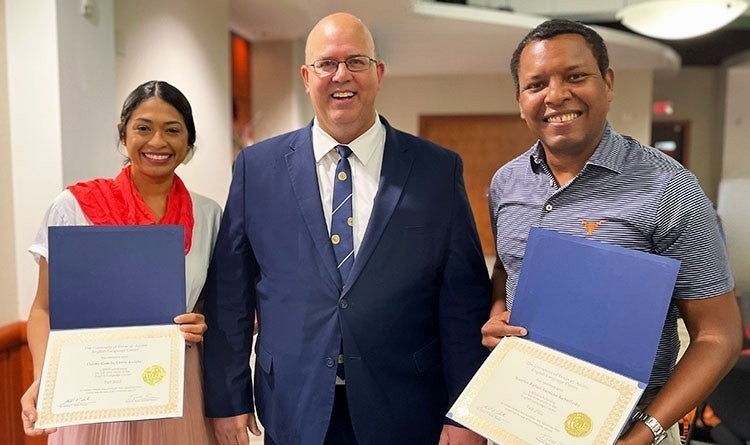
“Those programs give access to students who normally wouldn't be able to come to UT,” said Smith. “They extend UT's vision and resources and values to students who either don't have time or can’t come for a degree but still want to come have a Longhorn experience.”
Guiding Principles, Global Benefits
Functionality emerged as a theme in Smith’s thoughts, echoing across the ELC’s objectives and programming. It’s born not from a notion of English as superior to other languages, he specified, but instead from a pragmatic recognition of its commonality across the globe.
“English is an international language — a ‘lingua franca.’ It’s a tool to help you do things,” said Smith. “Even when studying in your own country, for a lot of fields, advanced research and textbooks and journals are all in English. You can go to a conference abroad with people from all over the world, and English is going to be the language used.
“You don't have to give up your own culture or languages ... but the only way the English-speaking world will know you is through the language you use,” he continued. “We want to make sure you have enough English so that others can really know you and not make judgments based on your level of fluency.”
Insights from a Lifetime in Language
Looking back over a quarter century of transformative work, Smith expressed gratitude for his career, alongside an immense appreciation for colleagues, partners and the students whom they serve.
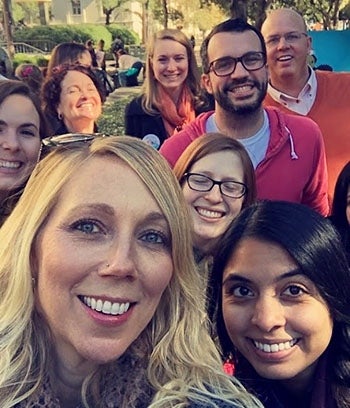
“Those involved in international education are some amazing people,” said Smith. “Watching somebody — through language — transform in who they are and what they can do is so satisfying. And working with other professionals who enjoy facilitating that: It makes coming to work an awesome experience.”
For more than 30 years, Smith has worked with teachers and learners from around the world to help people from different countries understand each other. The depth of this experience led him to a final heartfelt observation:
“International education teaches you that people, no matter where they're from, aren't all that different, at their foundational level. The things that I'm worried about, the things that bring me joy, the things that I'm working for in my life, are the same things pretty much everybody, wherever they are. We have much more in common than we have not in common.”

